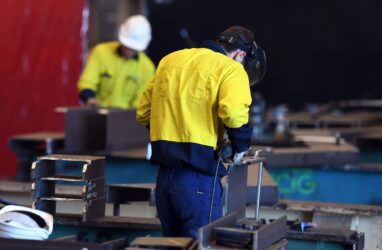Feed aggregator
“Stop dividing us”: Andrew Forrest attacks pro-nuclear politicians
The post “Stop dividing us”: Andrew Forrest attacks pro-nuclear politicians appeared first on RenewEconomy.
Australian gas giant signs on green steel hopeful for CCS
Our native animals are easy prey after a fire. Could artificial refuges save them?
GE to provide turbines for world’s biggest hydrogen only power plant in Whyalla
The post GE to provide turbines for world’s biggest hydrogen only power plant in Whyalla appeared first on RenewEconomy.
Turnbulls win tender to pursue 1GW of pumped hydro projects in Hunter Valley
The post Turnbulls win tender to pursue 1GW of pumped hydro projects in Hunter Valley appeared first on RenewEconomy.
No nuclear option for $275m green-manufacturing and innovation grants
The post No nuclear option for $275m green-manufacturing and innovation grants appeared first on RenewEconomy.
RePlanet plans pilot for monitoring of biodiversity credit projects
Australian carbon exchange will not impede OTC market, Clean Energy Regulator says
A ‘war on red meat’? No, changes to Australian dietary guidelines are just a sensible response to Earth’s environmental woes
Bangladesh bans adopting elephants from the wild
Bangladesh bans adopting elephants from the wild
‘It looked like we were at sea’: UK River and Rowing Museum faces up to climate threat
Near flooding of Henley-on-Thames building prompts decision to tell the story of climate crisis
From the reconstructed riverside of The Wind in the Willows to an historic Georgian rowboat used in the inaugural Oxford-Cambridge race, the exhibits at the River and Rowing Museum celebrate the importance of British rivers.
But the award-winning building in Henley-on-Thames – designed by the modernist architect David Chipperfield – is facing a significant threat from the very river beside which it resides.
Continue reading...How about charging dog owners £100 for a licence to cover the costs of poo? | Ros Coward
The country’s 13 million dogs create a lot of mess that’s hard to dispose of, dangerous and harmful to the environment
An unlikely folk hero has emerged in the Venice beach area of Los Angeles. Their identity is unknown, but their popularity is down to their homemade flags on cocktail sticks stuck into piles of dog faeces with messages like “Lazy. Pick. Up. Your. Dog. Poo”. The message is going down well. “I’m a big fan,” said one local. “No one wants to see a dog poop everywhere.”
These are the exact tactics that were used in Britain back in the 1980s, when dog faeces on the streets first began to be seen as unacceptable. Campaigners stuck little flags with similar messages aimed at getting dog poo off streets and public play areas. In many ways it was a successful campaign. There’s now widespread consciousness of the dangers to children of toxocara disease caused by accidentally ingesting excrement via their hands. And there are very few who would put up a public defence that a faeces-littered pavement is a sign of the healthy freedom of its citizens.
Continue reading...Support for clean-air traffic scheme in Chelsea plunges Tory MP into row
London minister Greg Hands embroiled in congestion and pollution debate with constituents over scheme in election battleground
When the Tory minister Greg Hands criticised a trial scheme in his constituency to block the use of residential roads as rat runs, he might have expected to win some votes and boost his party’s pro-car agenda.
Instead, he finds himself embroiled in a charged and divisive debate in his Chelsea and Fulham constituency, with a backlash from some Tories who back measures to curb traffic and introduce clean-air neighbourhoods.
Continue reading...Gupta puts hand up for Whyalla green hydrogen, but will take Santos gas first
The post Gupta puts hand up for Whyalla green hydrogen, but will take Santos gas first appeared first on RenewEconomy.
Infrastructure firm launches Philippines’ first biodiversity offset project
Cinnamon frog species in ‘perilous state’ successfully bred in UK
Froglets from species classed as near-threatened arrive for the second time at Cotswolds wildlife park
A frog species that is in a “perilous state” due to an infectious disease has been successfully bred at a wildlife park in Oxfordshire.
Keepers at the Cotswold wildlife park in Burford have again bred the near-threatened cinnamon frog, four years after it became only the second zoological collection in Europe to breed the species.
Continue reading...Straws, vapes and a lady’s sex toy: the Manly diver who’s spent 30 years clearing marine plastic
‘Tricky’ Nicholls has pulled decades’ worth of Sydney’s rubbish out of the sea by hand – but he still has hope for our oceans
Every morning a tractor rolls over Manly’s picture-perfect beaches, scraping away the signs of the day before. But below the water’s pristine surface, where council clean-up teams struggle to scour, a jumble of plastics tell a different tale.
It is a story Richard Nicholls knows well. Over three decades, the 63-year-old “Tricky” Nicholls has led thousands of divers and snorkelers on monthly clean-up dives while tracking trends in Sydney’s marine plastics.
Continue reading...‘Poisoned by chemicals’: citizen scientists prove River Avon is polluted
Charity blames the decline of invertebrates on farming, sewage and run-off from roads and homes, months after the Environment Agency told them the water in Wiltshire river was clean
A citizen science programme has revealed the decline of one of the country’s most significant chalk streams after claims by Environment Agency officials that it had not deteriorated. The SmartRivers programme run by the charity WildFish, which surveys freshwater invertebrates, reported “strong declines in relation to chemical pressure” on the River Avon in Wiltshire. It said its data indicated a decline in the condition of the river over the last five years.
The charity compiled a report on its findings after the conservation groups say they were told at a meeting by the Environment Agency in August that “the Avon has not deteriorated in water quality in the last five years”. David Holroyd, head of water quality for Wiltshire Fishery Association, said the numbers of invertebrates collected in spring and autumn samples from 2019 and 2023 at 11 sites on the upper Avon had shown a decline.
Continue reading...Abandoned pipelines could release poisons into North Sea, scientists warn
Researchers say toxic chemicals pose a pollution risk as oil and gas companies are allowed to leave pipelines to rot
Decaying oil and gas pipelines left to fall apart in the North Sea could release large volumes of poisons such as mercury, radioactive lead and polonium-210, notorious for its part in the poisoning of Russian defector Alexander Litvinenko, scientists are warning.
Mercury, an extremely toxic element, occurs naturally in oil and gas. It sticks to the inside of pipelines and builds up over time, being released into the sea when the pipeline corrodes.
Continue reading...







